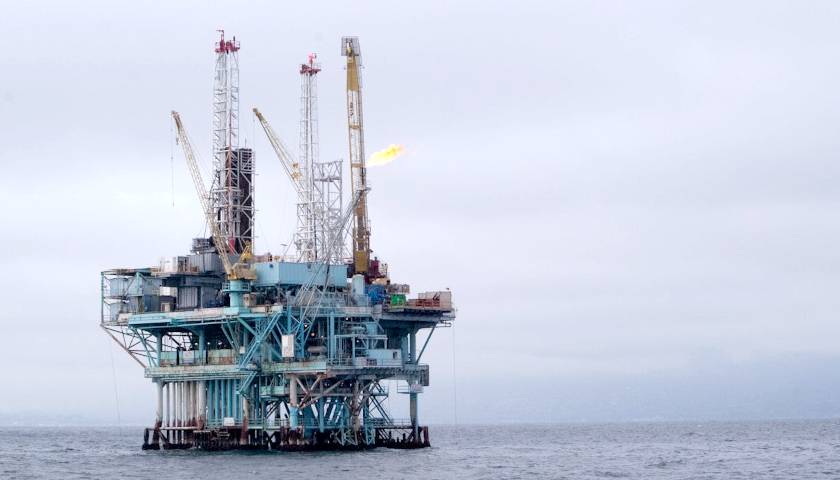by Tim Tarpley
Offshore drilling has been a cornerstone of global energy production since the 1800s, fueling the American way of life and powering the global economy. From the early days of “on-water-drilling” to the advancement of the fixed platform units of today, offshore drilling has consistently contributed around 30 percent of global oil production. In the U.S., supply on federal offshore lands in the Gulf of Mexico alone accounts for approximately 15 percent of total crude oil production.
Despite the emergence of new energy sources, the U.S. and the world will continue to rely heavily on oil and gas in the coming decades. In fact, the U.S. Energy Information Administration (EIA) predicts a 50 percent increase in worldwide energy demand by 2050.
Regrettably, instead of taking proactive steps to incentivize the production of more energy to meet the growing demand, the Biden administration has resorted to every delay tactic and legal maneuver possible to impede American’s access to this resource. These actions are denying Americans the offshore resources that are crucial for our energy security and economic prosperity.
These delays have already forced Congress to act, passing language in the Inflation Reduction Act to force the Department of Interior to restart lease sales despite the Outer Continental Shelf Lands Act (OCSLA) requiring the preparation and maintenance of forward-looking five-year plans.
Just the other day, while testifying in front of the Senate, Acting Interior Deputy Secretary Laura Daniels-Davis claimed that the department had only just begun preparing for a 2025 lease sale, a task that would likely take “at least 18 months.” Unfortunately, that means that we appear set to miss lease sales in 2024 and 2025. This is unacceptable and a clear violation of the law.
This unacceptable delay will further exacerbate the already limited number of lease sales included in the current five-year program, which is the smallest ever.
Such delays have severe consequences for the American people, ultimately impacting their pocketbooks, which are already hit hard by continued inflation. From a workforce perspective, the Gulf of Mexico offshore oil and gas industry alone supported an estimated 372,000 U.S. jobs in 2022 and contributed approximately $30.8 billion to the GDP.
Looking ahead, the offshore industry is anticipated to maintain a consistent contribution, averaging about $31.4 billion to the GDP per year from 2022 to 2040, along with over $7.4 billion in annual government revenue. Limiting access to these vital offshore resources not only harms the U.S. economy and employment but also jeopardizes our energy security and forces reliance on less responsible and reliable foreign sources.
Why would we clamor to outsource American energy security in a time of significant geopolitical conflict?
U.S. offshore production is also some of the lowest emission production in the world. Thanks to stringent methane management and regulatory oversight, the U.S. Gulf of Mexico stands out for its significantly lower carbon intensity compared to other oil-producing regions. In short, we produce lower emission per barrel fuel than nearly anywhere else in the world.
Increasing domestic offshore production could offset higher-emission foreign crude, resulting in a remarkable 46 percent decrease in the international average carbon intensity. The Gulf’s environmental performance continues to improve, with carbon emissions decreasing by approximately 60 percent from 2011 to 2017, even as oil production increased by over 35 percent.
Instead of hampering domestic energy production through bureaucratic delays, we should prioritize America’s vast energy potential. Technological advancements and innovations in the energy sector, such as automated drilling tools, electric fracturing, and comprehensive methane monitoring, are enabling more efficient and environmentally responsible production than ever before.
The shale revolution has already transformed the U.S. into a global energy powerhouse with abundant and affordable natural gas resources. Expanding responsible offshore development and liquefied natural gas (LNG) exports would bolster domestic production and employment and provide reliable energy sources to our allies, reducing their dependence on hostile nations. Denying our allies access to American energy sources contradicts our shared goals of energy security and emissions reduction.
It is time for the Administration to prioritize American energy dominance and security. Expediting offshore lease sales, streamlining permitting processes, and promoting technological innovations will unlock our nation’s vast energy potential, strengthen our economy, and support allied nations. The future of American energy leadership depends on bold action today.
– – –
Tim Tarpley is President of Energy Workforce & Technology Council, the national trade association for the global energy technology and services sector, representing more than 650,000 U.S. jobs in the technology-driven energy value chain.
Photo “Offshore Oil Rig” by Kayden Moore.




